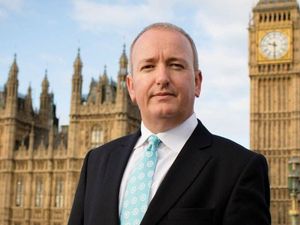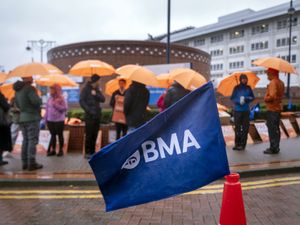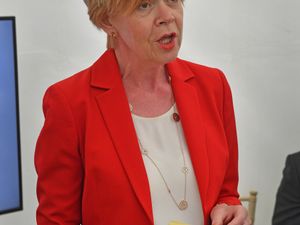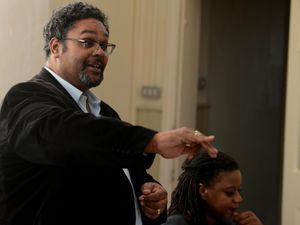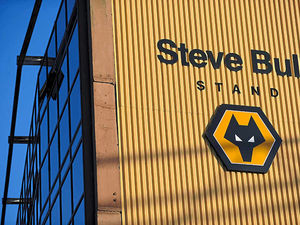Exclusive: Tony Blair under the spotlight on Labour, Brexit and Iraq - with VIDEO
We put the former Labour prime minister under the spotlight during a visit to the Black Country.
Tony Blair insists there is more to his legacy than the Iraq War and says he has no fears about any future legal challenges over his role in the conflict.
The former Labour prime minister’s reign has come to be largely defined by his decision to lead the country into the 2003 conflict, with calls for him to face prosecution since the explosive findings of the Chilcot inquiry in 2016.
It concluded that Mr Blair was not ‘straight with the nation’ over the invasion, which it described as ‘unnecessary’.
But speaking to the Express & Star, Mr Blair said his administration accomplished ‘so much more’ during a decade in power.
In a wide-ranging interview he also said he believed Labour could win the next election under Jeremy Corbyn – but claimed the party should be ‘20 points ahead’ in the polls due to the ineptitude of the Tory government.
WATCH the full interview here:
However, he refused to be drawn over whether his old hard left foe would make a good prime minister.
Mr Blair also said he was ‘distressed’ over Labour’s anti-Semitism crisis, saying that the leadership was ‘so anti-Israel’ that it did not really understand the issue, a position that had encouraged a hatred of Jews from some members.
He also voiced his concern at the rise of Momentum and the far left, claiming the views they held ‘were not really in the tradition’ of the Labour party.
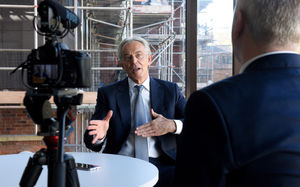
On Brexit, he said that Theresa May was left with a choice between ‘pointless and painful’ when it comes to a deal with the EU.
He claims this means another referendum – which he wants to see – is ‘entirely possible’.
Mr Blair was in the Black Country as a guest of Dudley North MP Ian Austin.
He visited Brierley Hill Police Station to talk to senior officers and beat bobbies, and also spoke with engineering students at Dudley College’s Advance campus.
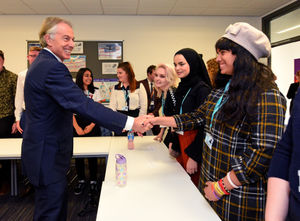
His attendance was kept secret until he left the area and saw a large security presence, with guards shadowing his every move.
Asked how he felt about his legacy being defined by the Iraq War, he said: “People have just got to decide whether they are going to think that is the only thing that the Government did. We can have a debate about that, and what the rights and wrongs of it are.”
Asked if he was concerned that he may one day face legal proceedings over Iraq, he said: “No. This was a decision we took as a Government at the time.”
Police ‘dealing with social problems rather than crime’
Britain’s broken criminal justice system meant that police were having to deal with ‘social problems’ rather than fighting crime, Mr Blair said as he met with officers in Brierley Hill to discuss the region’s crime epidemic.
He was guest at a round table event chaired by Chief Superintendent Sally Bourner, that also featured PCC David Jamieson, neighbourhood officers and PCSOs.
Following the meeting, Mr Blair, who pledged to be ‘tough on crime and on the causes of crime’ when he was in power, said he still had a major interest in law and order.
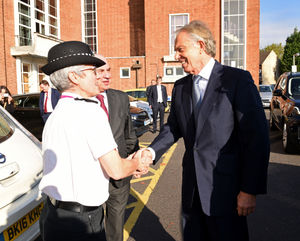
“I’m really interested – and concerned – in the fact that crime is back now as a really important issue,” he said.
“The officers are doing a fantastic job, but the truth is their numbers have been cut pretty savagely.
"And its not just their resources that have been cut but the basic social infrastructure to deal with some of the problems that people have, so a lot if the problems for police out on the street at the moment are problems they really shouldn’t be dealing with.
“They are almost dealing with social issues when they have got to be fighting crime.
“It is very hard for police to deal with, even though they are doing the best they possibly can do in exceptionally difficult circumstances.”
‘Time for overhaul of foreign aid funds’
Mr Blair admitted that it is time for an overhaul of Britain’s foreign aid system in a bid to curb the threat of international terrorism and to stop mass migration.
The policy of Britain spending 0.7 per cent of GDP on foreign aid was brought in by Mr Blair when he was Labour Prime Minister in 1997.
The country now sends more than £13 billion a year abroad in aid, a figure which critics say would be better spent at home on the NHS, schools and emergency services.
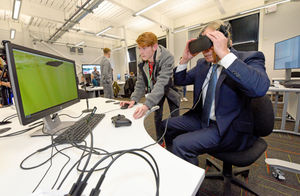
Addressing politics students at Dudley College, Mr Blair conceded there needed to be a rethink over how the cash was spent.
But he insisted it was vital to stop the growth of terrorism in developing countries – and the waves of mass migration that resulted from the rise of terror groups.
“I think we are going to have to be much smarter about how we are going to use that money,” Mr Blair said.
“And I don’t think we should be at all hesitant about using what is a big financial commitment to the world, to boost the image of our country and to boost the standing of our country.
“We have probably helped to save millions of lives through these programmes in the last few years.
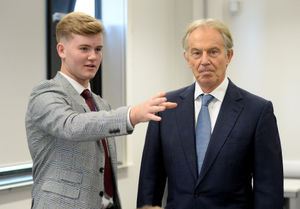
“I would be happy if we were also making sure that we were boosting the ability of our country to invest, if we were using it to make sure that the standing of the country was improved, and we were advocating for our country.
“The British development department is a big asset. I understand people asking why are we spending these billions of pounds on people abroad and not on our health service back home.
“But in the long term this is a big investment for our country
“Take the challenge of terrorism in the northern part of sub-Saharan Africa.
“Investing in them right now would be a very sensible investment for the future for Britain and Europe, because otherwise you are going to get big waves of migration coming from these places.
“You already have other radicalisation and terrorism there.”
Reliance on US
Mr Blair also said he feared that Britain was losing its influence on the world and would become more reliant on the US after Brexit.
He said: “In today’s world if you are a medium-sized country – which is what we are – you need alliances.
“Our main alliances with America and Europe are the foundation stones of British foreign policy.”
He said leaving the EU would diminish one part of the alliance, which would mean Britain would need to build its armed forces to increase security.
“We are going to have to do everything we can to make the country attractive as a place to come to and invest. And we are going to have to keep some sort of relationship with the European Union, even outside of the European Union – possibly around security and defence.
“And we will probably have to come even closer to America. In the short term, for sure [Britain] will lose influence.”

